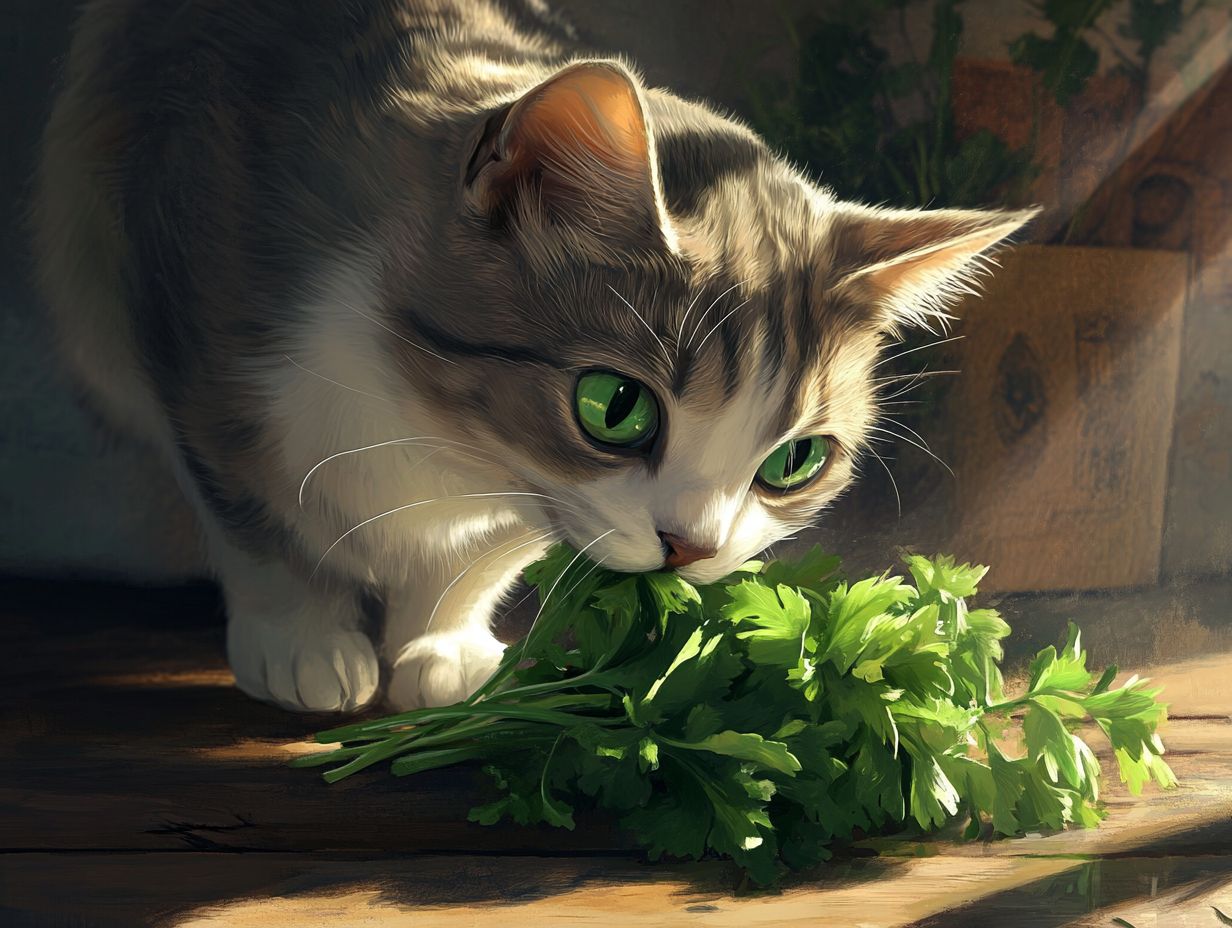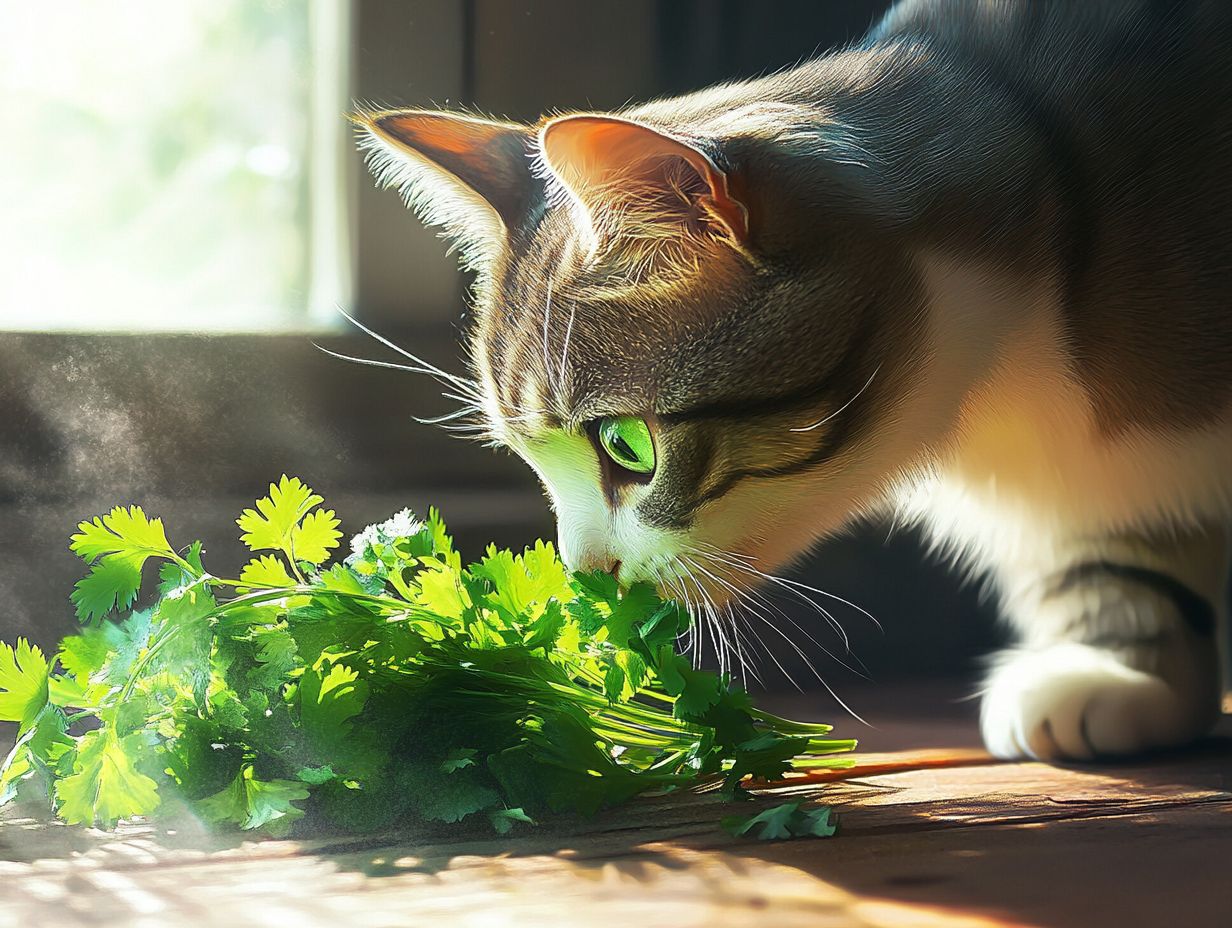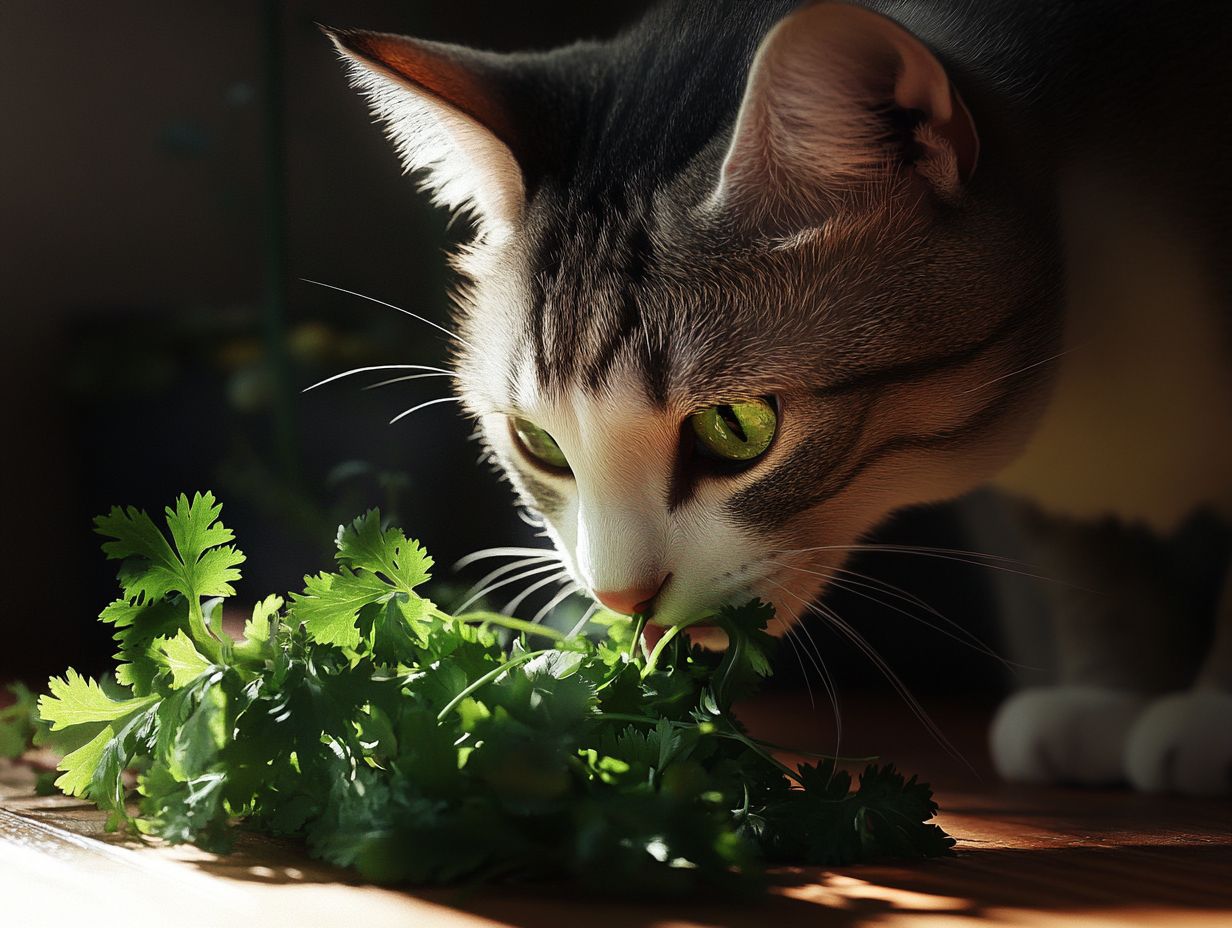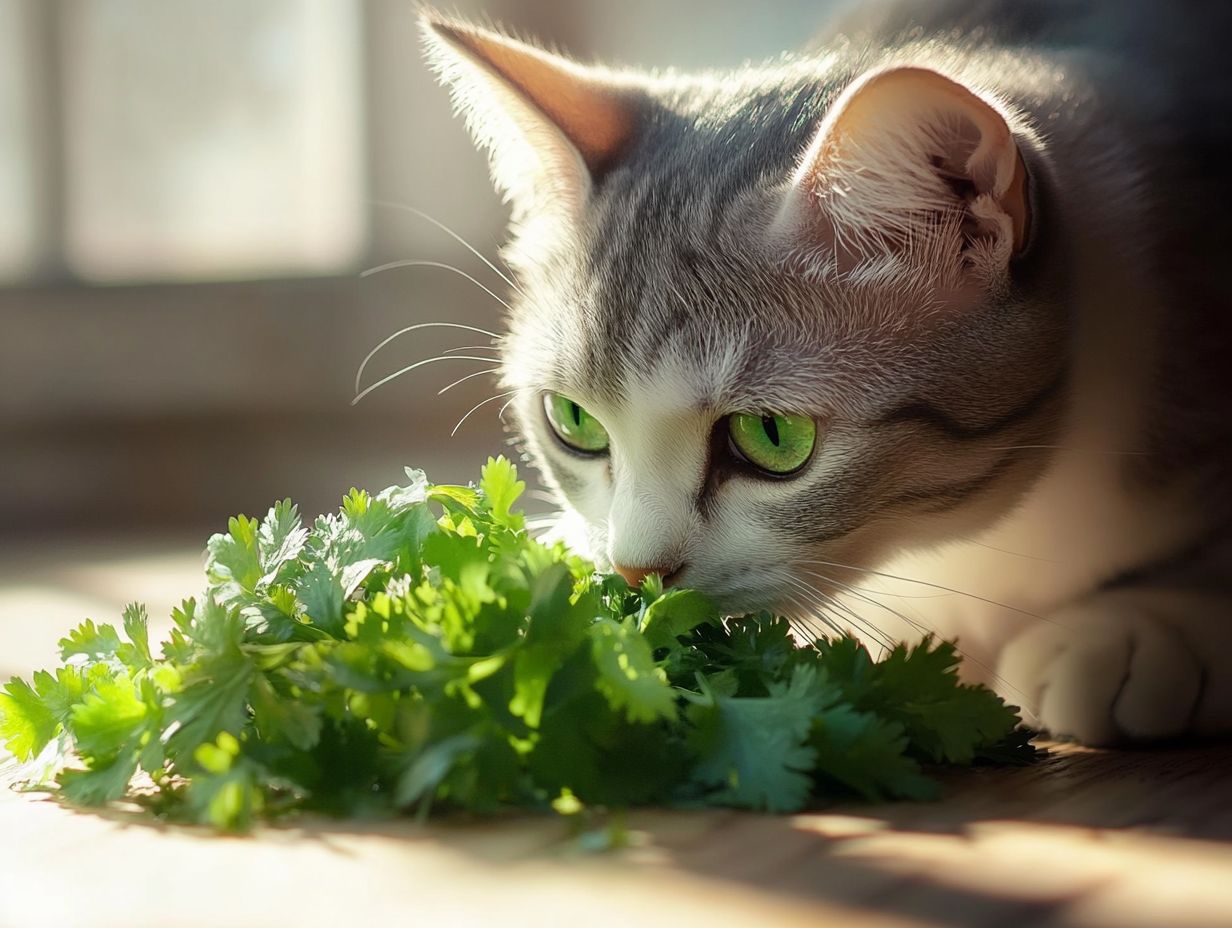Wondering if cilantro is safe for your cat? This article provides clear answers about the benefits and risks of feeding cilantro to your feline friend. For more detailed information, consult trusted veterinary sources.
As pet owners, we often seek to enhance our cats’ diets with nutritious options, but not all human foods are suitable for them.
This article explores the dietary needs of cats, the potential health benefits cilantro might offer, and the risks involved in feeding cilantro to your feline companions.
Additionally, we highlight alternative herbs and spices, such as catnip and parsley, and provide tips for safely introducing any new food into your cat’s diet, ensuring they receive the essential nutrients they need.
Dive in to learn more!
Key Takeaways:

- Cats can eat cilantro in small amounts, but it is not necessary for their diet.
- Cilantro may provide some health benefits for cats, such as improving digestion and boosting immunity.
- However, feeding cats too much cilantro can lead to potential risks, such as allergic reactions. It is important to introduce cilantro slowly and in moderation.
Can Cats Eat Cilantro?
Cats are naturally curious about various herbs and plants, prompting many pet owners to question whether cilantro—a common culinary herb in Indian, Brazilian, and Mexican cuisine—is safe for their feline companions. Understanding the effects of cilantro on cats is crucial, as some herbs can be beneficial to their diets while others may be harmful.
Generally, cilantro is considered safe for cats; however, it is essential to consider your specific pet’s dietary needs and preferences before introducing new ingredients into their diet.
Understanding Cats’ Dietary Needs
The dietary needs of cats are crucial for their well-being, as felines are obligate carnivores that require a diet rich in animal-based proteins and essential nutrients. Unlike herbivores, cats have digestive systems specifically designed to process animal proteins, necessitating a balanced intake of nutrients such as Vitamin A, Vitamin C, and Vitamin K.
Additionally, these small carnivores need taurine, an amino acid vital for heart and eye health. This underscores the importance of selecting high-quality commercial food options that meet these dietary requirements. Fiber also plays a significant role in a cat’s diet, helping to prevent digestive issues like hairballs and obesity.
While cats require few herbs, moderate amounts of cilantro can aid digestion and introduce flavor variety. A well-balanced diet not only promotes physical health but also contributes to emotional contentment and overall well-being, making it essential for pet owners to carefully consider their cats’ dietary preferences.
Potential Health Benefits of Cilantro for Cats
Cilantro, also known as coriander, may offer several health benefits for cats, making it a potentially valuable addition to their diets when introduced safely. This herb is rich in Vitamin A, Vitamin C, and Vitamin K, which can support immune function and overall health in cats, enhancing their overall diet.
Additionally, the fiber content in cilantro may aid digestion, promoting feline health.
Improving Digestion and Immunity

Cilantro offers several benefits for cats, particularly in digestion and immunity. It contains fiber that aids digestion, along with Vitamin A, Vitamin C, and Vitamin K, which are essential for a well-functioning immune system to keep cats healthy and active.
While cats can eat cilantro, it is important to introduce it into their diets properly. Begin by incorporating cilantro gradually and in small amounts. A small pinch of finely chopped cilantro per meal is generally safe. Start with a sprinkle of finely chopped cilantro in their regular meals, allowing their taste buds to adjust to this new flavor.
After introducing cilantro, monitor their behavior and stool consistency to assess how well they are adapting. It is essential to watch for any adverse reactions, such as digestive upset. Although allergies are rare, they can occur. Symptoms like itching and vomiting may indicate an allergy, and in such cases, cilantro should be removed from their diet, and a veterinarian should be consulted.
Over time, cilantro can enhance the flavor of meals and provide culinary variety, contributing to the overall health of our feline companions.
Risks of Feeding Cilantro to Cats
While cilantro can offer benefits, it is essential to be aware of the potential risks as well. Potential risks include:
- Allergic reactions: Monitor your cat for symptoms like itching, vomiting, or changes in behavior.
- Digestive issues: Excessive amounts can lead to upset stomach or diarrhea.
Alternative Herbs Safe for Cats
There are several alternative herbs that are safe for cats, such as:
- Catnip: Known for its stimulating effects, catnip can enhance playfulness and reduce stress.
- Parsley: A source of vitamins and minerals, parsley can support urinary health and freshen breath.
If you choose to introduce cilantro, start with small amounts and monitor your cat closely. Always consult your veterinarian if you notice any adverse reactions. We’d love to hear your experiences or questions about feeding cilantro to your cats!
Cilantro offers numerous benefits for cats, but there are also risks associated with feeding it, including allergic reactions and digestive issues. While cilantro is generally safe for cats when introduced properly, some cats may be sensitive to certain herbs. Monitor your cat closely when introducing cilantro to their diet.
Benefits of Cilantro for Cats
Cilantro contains antioxidants, vitamins, and minerals that can support your cat’s immune system, aid in digestion, and promote a healthy skin and coat. However, it should only be offered in moderation.
Possible Allergic Reactions
Allergic reactions in cats can occur after introducing new foods such as cilantro. Pet owners should closely monitor their pets for any adverse reactions during the initial stages. Symptoms may include gastrointestinal upset, skin irritations, or changes in behavior. If these occur, consult your veterinarian immediately.
Recognizing symptoms early allows for prompt action. Watch for signs such as excessive scratching, watery eyes, or vomiting, indicating a negative reaction to cilantro. It’s essential to be mindful of the quantities of cilantro in your cat’s diet and make adjustments as necessary.
Regular veterinary checkups, as recommended by the ASPCA, can help prevent allergic reactions. Keeping a food diary to track cilantro intake and any reactions can also be beneficial.
Alternatives to Cilantro for Cats
If you’re looking for alternatives to cilantro that are safe for cats, consider the following herbs, which offer similar benefits:
- Dandelion: Supports digestion.
- Catnip: Known for its stimulating properties.
- Chamomile: Helps with relaxation.
- Echinacea: Boosts the immune system.
- Valerian: Can help calm anxious cats.
Other Herbs and Greens to Consider

These herbs are safe alternatives to cilantro and provide various health benefits for feline companions.
How to Safely Introduce Cilantro to Cats
When introducing cilantro to a cat’s diet, do so with caution to ensure it is safe and beneficial. Start by offering small amounts mixed into their regular food, observing their response over the following hours and days.
Tips for Incorporating Cilantro into Diet
Introduce cilantro gradually to ensure proper tolerance. Begin with a pinch of finely chopped cilantro in their meals, watching for any signs of allergies or digestive distress. Pay attention to changes in texture or aroma to make the food more appealing. Keeping a journal to track the amount of cilantro given and any reactions observed over several days is advisable.
If your cat enjoys cilantro, gradually increase the quantity while closely monitoring their behavior and stool consistency. Should any unusual reactions occur, consult your veterinarian to confirm that adding this herb is beneficial for your cat’s health.
Frequently Asked Questions
Can cats eat cilantro?

Yes, cats can eat cilantro in small amounts as an occasional treat. However, it should not be a regular part of their diet.
What are the health benefits of cilantro for cats?
Cilantro contains antioxidants, vitamins, and minerals that can support your cat’s immune system, aid in digestion, and promote healthy skin and coat.
Can cilantro be harmful to cats?
Yes, while cilantro is generally safe, it can cause allergic reactions or digestive issues in some cats. Always introduce it gradually and monitor for any adverse effects.
Cilantro and Cat Safety: What You Need to Know
No, cilantro is not toxic to cats. While cilantro is not toxic, excessive consumption can lead to digestive issues such as stomach upset and discomfort for your cat.
How much cilantro can I give my cat?
It is best to give your cat small amounts of cilantro as an occasional treat. Offer about half a teaspoon per serving, no more than once or twice a week. You can mix it with your cat’s regular food to help them adjust to the new flavor. Always consult with your veterinarian before introducing any new food to your cat’s diet.
Are there any alternative herbs to cilantro for cats?
Yes, there are other herbs that are safe and beneficial for cats. For instance, parsley is safe for cats in moderation and can aid in digestion, while basil may help with inflammation. Always do your research and consult with your veterinarian before introducing any new food or herbs to your cat’s diet.
Conclusion: Cilantro can be a safe and enjoyable treat for your cat when given in small amounts. Always consult your veterinarian before introducing new foods.